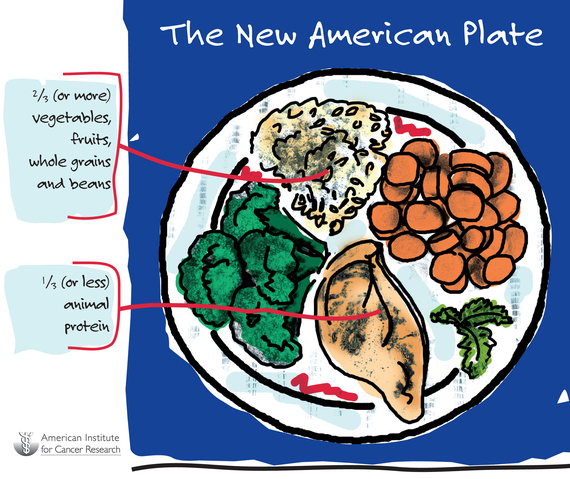By: Peiying Yang, Ph.D., Lin Lin Shao, senior clinical dietitian, and Lorenzo Cohen, Ph.D., Integrative Medicine Program
The American Institute of Cancer Research (AICR) has developed The New American Plate to help us reorganize the quantities of food groups on our plate to promote a more whole food, plant-based approach to nutrition.
Mounting evidence shows that eating a primarily plant-based diet reduces cancer risk and is recommended for cancer survivors. By consuming more plants, specifically fresh, non-starchy green vegetables, less animal protein and less added sugars, we can decrease our risk of cancer and improve outcomes for those with cancer.
Along with consuming a variety of types and colors of vegetables and fruit, it is beneficial to include cruciferous vegetables. Cruciferous vegetables, many of which are classified as dark green, leafy vegetables (broccoli, kale, Brussels sprouts, arugula, collards, mustard greens, turnip greens, chard, spinach, etc.), are great sources of micronutrients, phytochemicals, healthy antioxidants, and vitamins A, B, C, E and K. Dark green vegetables are low in calorie and carbohydrate content and also have a low glycemic index (a relative ranking of carbohydrates in foods according to how they affect blood sugar levels).
A whole food, primarily plant-based diet can be easy to achieve if you follow these tips:
1.Fill 2/3 of your plate with mainly colorful vegetables that are low in starch, some whole grains, and some fruit (more vegetables than fruit).
2.Limit intake of processed grains (white flour, pasta, bread, white rice, etc.).
3.Aim for:
5-7 servings* of vegetables per day
2 servings of fruit
No more than 6 servings of whole grains
*A serving of vegetable is ½ cup cooked/chopped or 1 cup leafy greens; a serving of fruit is 1 cup; a serving of grain is ½ cup cooked.
4.Fill 1/3 or less of your plate with protein sources: lean meats such as skinless chicken breast or fish/seafood; and vegetable proteins such as tofu, beans, legumes, and nuts.
5.Limit red meat choices (beef, pork and lamb) and avoid processed meats (smoked or cured meats or those that contain added ingredients as preservatives).
6.Aim for 3-5 servings of protein a day (a serving of protein is 3 oz. meat or tofu, ½ cup beans/legumes, 1/3 cup nuts).
7.Limit your sugar consumption. The American Heart Association recommends daily intake of added sugar should be approximately no more than 100 calories for women and less than 150 calories for men, 6 and 9 teaspoons respectively. Avoid (or limit) sugary beverages, candy and desserts and be aware of hidden sugar, which can be found in many pre-made and packaged foods (cereals, condiments, granola bars, etc.).
Studies in many cancer types have found that the more of the AICR dietary guidelines you follow, along with daily physical activity, the greater the cancer risk reduction and the better the odds of having a long and healthy life after a diagnosis of cancer. These same guidelines also reduce your risk of cardiovascular disease (heart disease and stroke) and diabetes, and there is emerging evidence linking lifestyle factors to Alzheimer's disease and dementia. As important, we know that following these guidelines will also lead to better overall quality of life. And if that was not enough, following a primarily plant-based diet is healthy for our planet.
If you are on active treatment for your cancer, have medical conditions that limit your dietary choices, or follow a special diet either because of personal choice or intolerance/allergies to certain foods, consider meeting with a dietitian to develop a personalized approach to your dietary needs.
Follow at: Twitter; Facebook; Integrative Medicine Program
